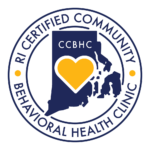This column was originally featured on Newportri.com.
Suicide Prevention Month (September) raised awareness of the urgent and complex issue of suicide, promoting effective tools and strategies to help identify and assist individuals in crisis. This conversation is crucial because, after 20 years of increasing suicide deaths, there are finally signs of progress—suicide deaths in 2023 have started to level off. Still, suicide rates are too high in Rhode Island and across the nation. Also alarming is that suicide is the second leading cause of death for teens and young adults aged 10 to 34.
Fortunately, suicide is highly preventable, and there are many resources in Rhode Island that are making an impact in this area (see list at the end of the article).
After a Crisis, What Comes Next?
Prevention is the goal. But what happens after a crisis, when someone has called 988 or an emergency line? How do you keep someone safe?
“Follow up matters,” says Brigitte Shaffer, Division Director of Crisis Stabilization Services at Newport Mental Health. “It can be as simple as a phone call. For us [emergency clinicians], if someone calls 988 or our crisis line, we follow up under a framework called Zero Suicide.”
Zero Suicide is a research-based approach adopted by Newport Mental Health and other area healthcare providers. It’s not just a protocol but a cultural shift that all of Newport Mental Health’s clinical staff practice daily. Everyone who comes to Newport Mental receives a comprehensive suicide risk assessment, which includes the use of the state-of-the-art Columbia Suicide Severity Rating Assessment. If someone screens positive for suicide risk, “a lot needs to be done,” Shaffer explains. “We immediately create a safety plan and provide additional support.”
Each client receives this personalized safety plan alongside their treatment plan. This includes utilizing the Stanley Brown Safety Plan, a brief intervention that equips those experiencing self-harm and suicidal thoughts with coping strategies to mitigate risk during a crisis. These strategies involve using distraction techniques, contacting others, or calling or visiting a crisis service. A key component is ensuring that lethal means, such as firearms, are removed from their immediate environment.
Follow-up includes continuous contact with the client, both phone calls and in-person visits, for as long as needed. Immediately following a crisis, Shaffer says, “We focus on ‘How do we get you through the next 12 hours?’ Then we reset and plan for the next 12 hours. We do the work to stay connected, so the client doesn’t have to worry about who to call and when.”
At Newport Mental Health, specially trained “zero suicide champions” review each plan, working with staff to adjust the plan as necessary. “It’s a two-way street,” says Shaffer. “Identifying risk, safety planning, increased follow-up – these are all examples of what we call the ‘pathway to safety.’ It’s how we plan to manage the crisis and shepherd the client back to safety and stability.”
“This pathway to safety is a supercharged treatment plan,” says Shaffer. “It’s integrated into the ongoing care and treatment, and while it’s a challenge, it’s a priority.
The goal is to eliminate suicide 100% of the time – Zero Suicide. Data across the country where the Zero Suicide approach has been used show a significant decrease death by suicide. We are starting to see the same results here in Rhode Island.
Help in a Crisis
If you or someone you know is in crisis, immediate help is available.
988 – This national helpline offers 24/7 call, text, and chat access to trained crisis counselors who assist people in suicidal, substance use, or mental health distress. In Rhode Island, calls are answered by BH Link, a 24/7 crisis center for mental health and substance use disorders located in East Providence. BH Link also offers walk-in services. Visit bhlink.org
Newport Mental Health 24-Hour Crisis Line (401-846-1213, option 1) – Residents of Newport County can call this crisis line any time, 24/7. Trained clinicians are available to speak with you and a mobile crisis counselor or the Rhode Island Outreach (RIO) team may come to you. RIO provides support in Newport County and the East Bay from 7 am to midnight, while licensed crisis clinicians are available for response 24/7.
Samaritans – This resource provides support for those in danger of suicide as well as those who have lost someone. Call 401-272-4044 or 1-800-365-4044.
Mental Health First Aid – You can receive training through Mental Health First Aid to identify signs of suicide risk and learn how to help by asking questions and starting a conversation. Contact Strategic Prevention Partnerships at 401-835-5311 or visit their website at strategicprevention.org to learn more about available training programs.




